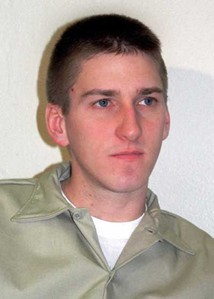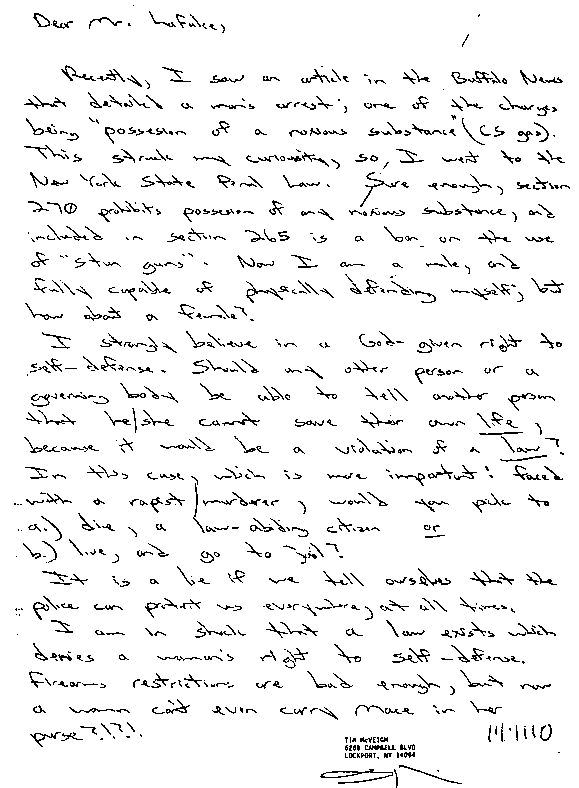Timothy McVeigh
by JoNeal Scully and Milton Moore
(Editor's Note: The comments which follow are based on Timothy McVeigh's handwriting in a 1992 letter to Representative John J. LaFalce (D-NY). We appreciate Gloria Weiss's suggestion for this report and for providing the sample.)
McVeigh's printed script with its extreme left slant (varying from 25° to 68° left of vertical) , extreme wide letter spacing (varying from 4 to 15mm) and bizarre signature contains many incongruent features. It is well-organized on the page (appears to have been written on lined paper) and gives the impression of order; however, the individual letters and words vary in slant, form, space and movement. Some letters are circular and similar to copybook; others are angular (e.g., the harsh y in Recently, 1st word, 1st par.), thready (am, line 8, 1st par.), curved (the "ladle"on the g final) and split (letter k). Most of the middle zone (MZ) is 2mm in height, but it varies from 1 to 4mm. The upper zone varies 2-4mm above the top of the MZ and the lower zone is 2mm below the baseline. There are creative movements (the h-i connection in this and which, 6th line, par. 2) and there are distorted and neglected forms. Unfortunately, space does not permit addressing all of the features of this script. Reader comments are welcomed for the next Journal.
Considerable agitation, anger and defensiveness are evident in both the content of the letter and in the handwriting (harsh angles, rigidity, heavy, forceful downstrokes and underlining). The movement throughout the script suggests an erratic discharge of energy (even the punctuation is unduly emphasized). Given his defensive nature and outlook on society and, lacking an appropriate outlet, his anger probably exists at all times. These factors result in a writing which features an ever-alert tension.
JoNeal describes the script as "crouched" because of this extreme tension combined with the extreme left slant. It is reminiscent of an animal, backed into a corner, fearful and expecting to be attacked. Like the animal, the writing is crouched and tense, and the writer is ready to spring to the attack in order to defend himself. JoNeal notes that while there is tremendous tension, there is actually little control. There are strong feelings and a volatile nature (varying left slant, uneven pressure, wavering of letters and words along the baseline, and inconsistencies of form); however, these feelings are kept to himself and are normally withheld from others. Few people will realize the explosive nature of this writer unless they know him very well-- or study his script.
From the content of the letter, McVeigh seems to project a concern for his own rights and wishes onto an apparent concern for a woman's right to defend herself. His anger regards his own causes (the right to possess a noxious substance). JoNeal identifies a pattern of defense and attack in this script, and the attack is not likely to be overt or "like a man," as McVeigh states in his letter, but rather covert and "sneaky" in a hidden, secret way. The handwriting indicators seen in this script are often found in scripts of those who are unable to express their inner feelings, fears and thoughts in a functioning way and who frequently behave inappropriately.
The script portrays a writer who will have difficulty establishing close relationships, especially with women. He will also have problems with his social interactions (print style, pervasive left slant, left trend, extreme word spacing, angularity, and rigidity). These indicators, plus the concaved shape of upper zone strokes on the left side and the g-ladles, point to a regressive nature and to one who has serious issues regarding nurturing. It is unlikely that he received sufficient nurturing during his childhood and now he doesn't allow it. It follows that he is unable to nurture others.
The small, angular script, with its attention to detail, indicates McVeigh's ability to concentrate. It also indicates that he uses "his" facts and logic to achieve his objectives; however, the neglect, the inconsistencies, the uneven letter and word spacing and variable slant all point to his distorted view of reality, resulting in a misinterpretation and misuse of facts. He can plan the details of an endeavor, take the necessary steps to accomplish it, and even rationalize it (when it doesn't make sense to others). Timothy McVeigh is probably very bright in some ways, but this writing reflects serious disturbances in his emotional and social development.
The discrepancy between the body of the script and McVeigh's signature is most obvious. Such exaggeration of his public face points to tremendous compensation for considerable insecurities. It shows that he wants to be seen as important, but characteristics in his script indicate that he is unlikely to receive recognition for the abilities he does have. Since he is unable to function well with others, he rarely remains with them long enough to accomplish anything worthy of recognition. He is more likely to gain acceptance from those who are dysfunctional like himself. He wishes that others would recognize him by his personal mark--which is bold and totally illegible. Sadly, however, he must place a signature block above his name to insure that he is identified. He wants to be seen as reaching out to society (signature placed to the right), but this is contradicted by his extreme withdrawal (body of the script).
In an exclusive interview with McVeigh, the July 3rd Newsweek states, "Armchair psychologists searching for psychic scars will be frustrated by McVeigh's childhood," suggesting that all was normal and harmonious; however, from his handwriting, it is apparent that his childhood experiences disturbed and affected him. The article speaks of his parents's divorce when he was ten and McVeigh notes that after the divorce his mother's whereabouts were "very sketchy in his mind." In an excellent series, the Washington Post (7-2/7-3) reports that McVeigh's high school friends and Army buddies said that he was uncomfortable around women and that the only female he mentions fondly is his younger sister.
Both articles note that McVeigh found a home in the Army, was a model soldier, and was promoted ahead of his contemporaries. He was able to function in the military where he responded to structure and authority and was able to demonstrate his gunnery skills and technical abilities. He also related to and formed a bond with his buddies from the Gulf War and commented, "You can literally love your battle buddies more than anyone else in the world." After leaving the Army, he was unable to adjust to civilian life, and as the Post said, he "was rudderless."
When Newsweek asked about his personal reaction to the grisly photos of the bombing victims, McVeigh joined in laughter with his attorney, Stephen Jones, who quipped "Get my attorney." McVeigh replied, "Right, this is getting pretty heavy." One of the guiding features of his handwriting shows this emotional detachment.
It is easy to comment, in retrospect, on the negative features of a handwriting of someone accused of such an atrocious crime; however, the anger, the nurturing issues, the lack of control, the degree to which he is out of touch with reality, and the extreme emotional withdrawal found in this script point to a very troubled writer. A competent graphologist can detect and realize from this script that an explosion will occur...sometime...somewhere.
Published in the American Handwriting Analysis Foundation Journal, Jul-Aug 95.
Copyright, Milton Moore and JoNeal Scully



